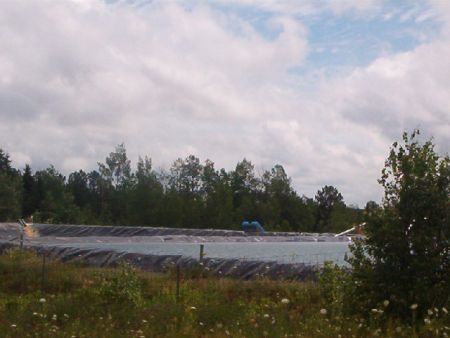Colchester County approved last week an Atlantic Industrial Services (AIS) application to discharge treated fracking waste water from Kennetcook to the Debert sewage treatment plant on a Bay of Fundy estuary.
If this gives readers a sense of deja vu, it is probably because this is exactly the same approval process that was launched early last year, ultimately ending with rejection by the County in May 2013.
Two months after the rejection by Colchester County, AIS tried to shop the fracking waste water to the Town of Windsor. With Environment Department permission and supervision, the company had in 2010 and 2011 discharged over 7 million litres of untreated fracking wastes from New Brunswick. While initially attracted to the revenue stream, Windsor followed suit with Colchester and rejected the proposal.
Longer in the works was the AIS initiated proposal to evaporate the treated waste water in the cement kiln at the Lefarge plant in Brookfield. One year after the Colchester rejection, the Department of Environment gave it's approval for that as a pilot project. The department recently approved the continuation of that project, after reviewing results from the testing of stack emissions and the cement product.
The Environment Department has declined to comment on why they did not require testing of the cement kiln dust, despite concerns about leaching from the tailings left around the plant, and used in biosolids spread on farm fields.
For reasons that are not known, while trucking wastes for disposal at the Lefarge plant, Atlantic Industrial Services has continued trying to find a municipality that would accept the discharge of the treated wastes into its sewer system.
The next attempt by AIS was to propose trucking the processed fracking waste water out of province to Dieppe. There it has rented the very small facility of a defunct waste water company, and seems to have essentially inherited the New Brunswick provincial certification for Acadia Waste Management. It appears that there is a two birds with one stone goal here: AIS solving its Nova Scotia problem, and at the same time establishing a precedent for processing New Brunswick fracking wastes that it is no longer allowed to transport to Nova Scotia.
At any rate, that AIS proposal is presently bogged down at the level of the provincial government. Municipal officials in Dieppe and Moncton do not yet have a formal proposal, but have displayed as much wariness about the prospects as have their colleagues in Nova Scotia.
So we come to the fifth stop in the saga of where does AIS unload the processed fracking waste water.... keeping in mind that we have yet to hear what the plans are for the solid form chemical and radionucleide contaminants removed from the waste water and now being stockpiled at the company's Debert facility.
Seemingly from nowhere, the Town of Amherst emerged as the solution. The Mayor, the CAO, and several councilors were all supportive of the proposal, but the swift pushback from residents overcame the attraction of the $500,000 offered. Amherst ended negotiations with AIS 3 weeks ago.
For it's next stop the fracking waste water saga returns to the beginning: AIS has applied once more for discharge from its facility into the nearby Debert sewage treatment plant. Council of Canadians regional organizer Angela Giles worked with Colchester residents during the 2013 process, and made a presentation at public hearings hosted by the municipality.
“How many times will the community need to fight this,” asks Giles. “And the timing of it all, with an appeals deadline during the holidays, makes it seem as though the County is trying to sneak this through.” She stresses that Colchester residents need to be contacting their Councilors, and that they consider registering to make an appeal submission before the December 29 deadline. [UPDATE: deadline extended to 12 January]
As with the 2013 AIS application, the current one has been approved by municipal staff. Unless Council chooses to also overturn the current approval, the company will be able to discharge the processed fracking waste water- 30 million litres at the Debert facility and at the two seven year old 'temporary' storage ponds in Kennetcook. Part of Colchester Council's consideration will be reviewing appeal submissions accepted from residents and non-residents of the County, which can take any form.
“This appears like a scramble by AIS to find any community to take the waste,” said Giles. “People working on this issue are asking, why are communities being forced to find their way out of a mess someone else made? Our provincial government obviously failed us at regulating Triangle Petroleum's operation in Hants County, and failed again at oversight when AIS was enlisted to get rid of the waste water mess. Provincial oversight has finally improved. But where is the leadership in finding an end to what Environment Minister Delorey has called our legacy issue?”
See also:
For copies of public appeals of the 2013 Colchester approval to discharge the wastes, see the attached file.
On the relationship between the Department of Environment and AIS:
No Fracking Problem: Nova Scotia Fracking Waste Broker Company Masquerades as Approved Processor Provincial “regulator” provides cover
Is There a Regulator in the House? Through the Fracking Rabbit Hole with Nova Scotia Environment



